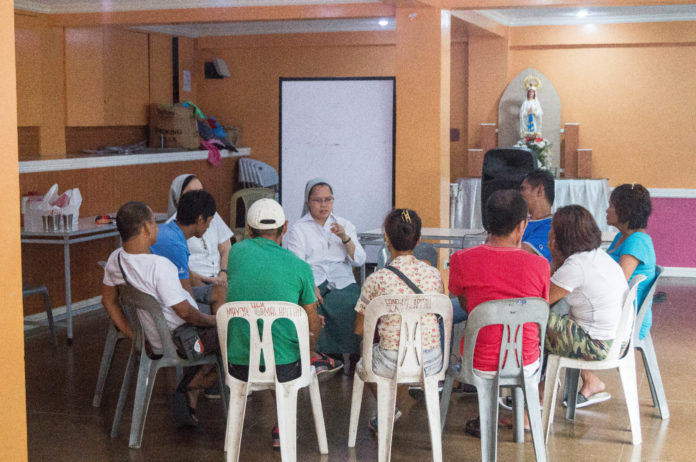
THE ALTERNATIVE Learning System (ALS) offered under the local government’s drug rehabilitation program has a potential to help solve the drug problem in the country that is still reeling from the Duterte administration’s bloody drug war.
Department of Education (DepEd) program specialist Kristine Lumanog said the country’s drug problem could be eradicated with proper guidance and counselling of drug addicts.
“Kung ma-encourage [ang mga drug surrenderers], mas [ma-lessen] na mahikayat sila ng maling barkada,” she told the Varsitarian.
The Community-Assisted Rehabilitation and Recovery Out-Patient Training System, founded by the Caloocan Anti-Drug Abuse Council (Cadac) in September 2016, started to offer ALS to drug surrenderers last July.
Sikini Labastilla, executive director of the Cadac, said the ALS alone would not be a solution to the drug problem.
“The drug menace can be solved by reducing supply, demolition of distribution networks and reducing demand by rehabilitating and continuously educating the users. ALS has a place in both the education and the rehab but not in the other pillars,” he said in an interview.
Cadac’s rehabilitation and training system for drug surrenderers is a six-month program involving rehabilitation activities for former drug users who were included in the police’s watch list and had voluntarily submitted themselves to authorities.
The rehabilitation activities are held at three shelters or pods in Our Lady of Lourdes Parish in Camarin and Bagong Barrio and San Roque Parish in Caloocan City.
Drug surrenderers undergo screening by the police, psychiatrists and doctors to determine if they are qualified for community-based rehab, before they are included in the list to be given to Cadac. A total of 101 drug surrenderers joined the first batch of ALS in the three pods.
“Mayroong aftercare na monitoring pa rin sa [drug surrenderers] for 10 months. Sa first month nire-require pa rin sila na mag-report weekly sa Caloocan City Social Welfare Development,” said Amillany Miranda, Cadac pod leader.
Miranda, who is also a psychometrician, said ALS was meant for drug surrenderers who were not able to graduate from high school.
‘Strengthen aftercare’
There is a tendency for the patients to go back to using illegal drugs when they are not monitored after rehabilitation.
“May mga bumabalik kasi hindi naman natin sila hawak. Kaya nga community-based, uwian ‘yang mga yan e. Hindi mo talaga ma-monitor `yung pagdating nila ng bahay nila, kung sino `yung mga nakakasama nila,” she said.
For the results of the rehabilitation to be in full effect, aftercare must be strengthened by providing livelihood to drug surrenderers, Miranda asserted.
“`Yong sa aftercare mas mapalakas pa sana siya kasi nu’ng una, bigla silang nahinto sa pagpunta sa pod, napapaisip na naman sila kung ano’ng gagawin nila. So mas maganda kung dire-diretso na talaga,” she said.
Lack of safety, budget
Another problem is the safety of teachers, Lumanog said.
“Siyempre may risk lalo na sa amin na nagtuturo sa kanila kasi hindi natin masabi kung anong level na ba `yung condition nila,” Lumanog said.
“For me, kailangan pa talaga ng policy guidelines at proposal for these surrenderers to tie up with DepEd ALS kasi mahirap na walang dashboard or roadmap ang Cadac, pare-pareho kaming nangangapa. Parang trial-and-error ang dating e, at stake ang mga teachers sa Cadac,” she added.
There is also a lack of ALS facilitators, and feedback and assessment from them.
“The module is inadequate. When I check in on the ALS sessions, all they seem to do is show recorded videos to the participants. There is no interactivity nor substance to the learning being provided,” Labastilla said.
Moreover, sustainability is in doubt because of the lack of budget, Lumanog said.
“Financial support is needed to sustain the program kasi walang mga materials na pagkukuhaan lalo na kapag informal education, `yung sa livelihood,” she said.
Sponsors are needed to properly implement ALS in their sessions, she said.
To investigate and expose unspoken issues and anomalies, send confidential news tips to the Special Reports team of the Varsitarian at specialreports.varsitarian@gmail.com or at THE VARSITARIAN office, Rm. 105, Tan Yan Kee Student Center, University of Santo Tomas, España, Manila.

















